DNA Today: A Genetics Podcast
Discover New Advances in the world of genetics, from technology like CRISPR to rare diseases to new research. For over a decade, multi-award winning podcast ”DNA Today” has brought you the voices of leaders in genetics. Host Kira Dineen brings her genetics expertise to interview geneticists, genetic counselors, patient advocates, biotech leaders, researchers, and more.
***Best 2020, 2021, and 2022 Science and Medicine Podcast Award Winner***
Learn more (and stream all 380+ episodes) at DNAtoday.com. You can contact the show at info@DNAtoday.com.
This show is part of "Gene Pool Media: The Science Podcast Network" head to GenePoolMedia.com to explore all our science themed shows.
Episodes
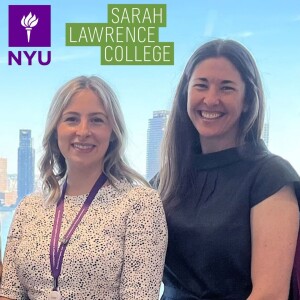
Friday Oct 25, 2024
Friday Oct 25, 2024
We are learning about an exciting, newer career in the genomics field: genome health analyst. This role is rapidly gaining importance as the demand for interpreting personal genomic data continues to grow, and healthcare systems need more professionals trained to make this data clinically actionable.
Joining us are Dr. Claire Davis and Anna Cantor, Co-Directors of the new Master's of Science in Genome Health Analysis program, which is a collaboration between NYU Grossman School of Medicine and Sarah Lawrence College.
Claire Davis has worked with the Joan H. Marks Graduate Program in Human Genetics at Sarah Lawrence College for nine years in various capacities. She is now Director of Curriculum for the genetic counseling program and the Institute for Genomics, as well as co-director of the Genome Health Analysis master's program created in collaboration with NYU Langone's School of Medicine. Claire previously worked as a cancer counselor and assistant director of the genetic counseling training program at Mount Sinai. She earned her doctorate in adult education and leadership from Teachers College, Columbia University, completing a dissertation on the professional learning of genetic counselors. She continues to volunteer for initiatives related to genetic counselors' learning and development.
Anna Cantor is the Program Director of Genetics Education at the Center for Human Genetics and Genomics at NYU Grossman School of Medicine and co-director of the Genome Health Analysis Master’s program.. She is a board-certified genetic counselor with clinical experience in cancer and autoinflammatory genetics. . Throughout her career, Anna has trained genetic counseling students and is now creating education initiatives for graduate and medical students, as well as healthcare professionals that aim to increase access to accurate genetics information throughout NYU Langone Health. Anna received her MS in Human Genetics from Sarah Lawrence College and her MA in Behavioral Neuroscience from the University of British Columbia in Vancouver, Canada. She completed her BA Hons in Psychology from Concordia University in Montreal, Canada.
In This Episode, We Discuss:
What motivated the creation of the MS in Genome Health Analysis program
Career opportunities for graduates in healthcare and genomics
The integration of bioinformatics, data science, and patient care in the role of a genome health analyst
How the collaboration between NYU and Sarah Lawrence College shapes the curriculum
Key courses that prepare students for real-world applications
Handling and interpreting vast amounts of genomic data
The significance of emerging ‘omics technologies and genome variant interpretation
Application tips for prospective students, including types of experiences to prepare them
Going to be at ASHG 2024? Come find Anna Cantor on November 7th with her poster from 2:30-4:30pmMT! Our host Kira Dineen will also be at the conference. So be sure to say hi if you see her. And she is recording sound bites on what you learned at the conference.
You can learn more about the Master's of Science in Genome Health Analysis program here. You can contact Anna Cantor directly at Anna.Cantor@NYULangone.org and Dr. Claire Davis at CDavis@SarahLawrence.edu.
Stay tuned for the next new episode of DNA Today next Friday! New episodes are released every Friday. In the meantime, you can binge over 300 other episodes on Apple Podcasts, Spotify, streaming on the website, or any other podcast player by searching, “DNA Today”. Episodes since 2021 are also recorded with video which you can watch on our YouTube channel, this includes some episodes recorded at NBC Universal Stamford Studios.
DNA Today is hosted and produced by Kira Dineen. Our video lead is Amanda Andreoli. Our social media lead is Kajal Patel. Our Outreach Intern is Liv Davidson. And our logo Graphic Designer is Ashlyn Enokian, MS, CGC.
See what else we are up to on Instagram, X (Twitter), Threads, LinkedIn, Facebook, YouTube and our website, DNAToday.com. Questions/inquiries can be sent to info@DNAtoday.com.

Friday Oct 18, 2024
Friday Oct 18, 2024
We're excited to announce the launch of our new Mock Genetic Counseling Session series! In our first installment, genetic counselor Catherine Mayo and student Ariel Modeste perform a mock cancer genetic counseling session, offering insight into how genetic testing for cancer risks is discussed with patients. This session was recorded in person, providing a more dynamic and engaging learning experience therefore, we highly recommend watching it on YouTube to fully immerse yourself in the interaction.
We hope this series is helpful for prospective and current genetic counseling students, as well as the general public, by demystifying the genetic counseling process. Understanding how these sessions work can empower individuals and provide valuable educational insights into this critical healthcare service.
Catherine Mayo (she/her), is a Genomic Science Liaison at a genetic testing company. She is a board-certified genetic counselor interested in rare diseases, increased access to genetics services, and social justice in healthcare. She has previous experience in biotechnology and drug development in the Bay Area.
Check out Catherine’s two other appearances on DNA Today. In Episode #110 we chatted about the film Gattaca, mostly how much technology in the film is no longer fiction. We recorded this when we were roommates in grad school together and are members of Sarah Lawrence’s Class of 2020. Catherine more recently shared insight in Episode #259, which was a recap and reflection on the 2023 National Society of Genetic Counselors’ (NSGC) Annual Conference.
Ariel Modeste (she/her) is currently in her second and final year in the Human Genetics Program at Sarah Lawrence College training to be a genetic counselor. Ariel is a graduate of LaGrange College with a B.S. in Biology and a double minor in psychological science and chemistry. The premise of this mock case was Ariel’s work as part of her internship with DNA Today.
Specialty: Cancer
Indication: A 26-year-old unaffected female is seen due to a family history of cancer.
Patient Name: Estelle Woods
Outline:
Contracting
Introduction to each other
Why were they referred to genetic counseling?
Explain what the session will entail
Ask if patient has any questions
Medical Intake
Family History
Take a pedigree
Patient Education
The purpose of all the questions that were asked
Genetics overview
Hereditary cancer risk factors and signs
Risk Assessment
Review the patient’s pedigree and explain what is suspicious and what isn’t and why.
What you would test for in the patient
Who the best person in the family is to be tested
Decision Making
Explain genetic testing
Explain the 3 possible results
Explain what each result would mean for the individual and their family members
Ask patient if they would like to pursue the genetic testing
Insurance and cost
NCCN criteria
Potential insurance coverage
Cash option without insurance
GINA
Consenting
Signing consent forms
Results
Turn around time
How results are provided
Recap information and final questions
Stay tuned for the continuation of our mock genetic counseling session series! Over the next year we will be bringing you more mock sessions inspired by a cumulation of cases.
Please note that the information provided in this mock genetic counseling session is intended strictly for educational purposes and should not be used for personal medical decision-making. If you have questions or concerns about your health, we encourage you to consult directly with a certified genetic counselor who can provide tailored medical recommendations. If you are in the United States, you can find a genetic counselor near you by visiting FindAGeneticCounselor.com.
The next new episode of DNA Today will drop on Friday! New episodes are released every Friday. In the meantime, you can binge over 300 other episodes on Apple Podcasts, Spotify, streaming on the website, or any other podcast player by searching, “DNA Today”. Episodes since 2021 are also recorded with video which you can watch on our YouTube channel, this includes some episodes recorded at NBC Universal Stamford Studios.
DNA Today is hosted and produced by Kira Dineen. Our video lead is Amanda Andreoli. Our social media lead is Kajal Patel. Our Outreach Intern is Liv Davidson. And our logo Graphic Designer is Ashlyn Enokian, MS, CGC.
See what else we are up to on Instagram, X (Twitter), Threads, LinkedIn, Facebook, YouTube and our website, DNAToday.com. Questions/inquiries can be sent to info@DNAtoday.com.
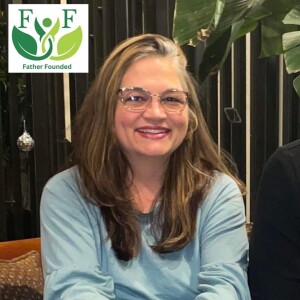
Friday Oct 11, 2024
Friday Oct 11, 2024
We explore the powerful work of Father Founded, an organization dedicated to reuniting Amerasian families separated by war. It shares the heartwarming story of Scott McMullen, a retired firefighter and veteran, who discovered his long-lost daughter through the group's efforts. Marny Klump, a dedicated volunteer, uses her skills in genetic genealogy to help Amerasians locate their biological fathers across continents.
I do want to offer a warning that our conversation includes sensitive topics like young adult death, sexual assault, and childhood abuse. These topics may not be suitable for children or people who have had these experiences themselves.
Scott's journey involves fathering a son in the Philippines, marrying the mother to bring him to the U.S., and later learning he had another child in the Philippines and connecting with his daughter Sherlyn, who was adopted and raised in another country. Despite challenges, Scott and Sherilyn have formed a close bond, united by their shared Amerasian experience. Scott Mcmullen is a father of 6, who retired in 2020 after 40 years as a Firefighter/EMT. He served 26 years in The Air Force Reserves as a Firefighter. He was elected to and served eight years on the Mount Vernon Washington city Council. He then recruited and helped the first three Hispanic people get elected to the Mount Vernon, Washington City Council. I thought it was unfair to have no Hispanic representation when his city’s population was 36% Hispanic. He and his brother flew to the Philippines to meet his biological daughter and her family. He lives part time in Angeles city, Philippines and was honored to have attended his grandchild's wedding!
Marny Klump, a Father Founded volunteer, shares how she became involved in reuniting families through genealogy and DNA testing, driven by the belief that everyone has the right to know their origins. The discussion emphasizes the importance of accessing biological family history and the challenges faced in the process. Marny was born in Toronto, Canada and moved to the United States when she was 16. She and her family currently live outside of Richmond, Virginia. Marny started doing her husband’s family tree in 2014. In early 2016, she started working with a group to help people put the pieces of their puzzles together. In August 2016, she learned how to use DNA to help those with misattributed parentage locate their biological family members. In April 2020, one of those cases led her to Father Founded, where she has been volunteering to help Amerasians with their quest to know their birth fathers.
You can learn more about Father Founded on their website here and donate here.
Stay tuned for the next new episode of DNA Today next Friday! New episodes are released every Friday. In the meantime, you can binge over 300 other episodes on Apple Podcasts, Spotify, streaming on the website, or any other podcast player by searching, “DNA Today”. Episodes since 2021 are also recorded with video which you can watch on our YouTube channel, this includes some episodes recorded at NBC Universal Stamford Studios.
DNA Today is hosted and produced by Kira Dineen. Our video lead is Amanda Andreoli. Our social media lead is Kajal Patel. Our Outreach Intern is Liv Davidson. And our logo Graphic Designer is Ashlyn Enokian, MS, CGC.
See what else we are up to on Instagram, X (Twitter), Threads, LinkedIn, Facebook, YouTube and our website, DNAToday.com. Questions/inquiries can be sent to info@DNAtoday.com.

Friday Oct 04, 2024
Friday Oct 04, 2024
Two-time Emmy-winning celebrity chef Sandra Lee joins the show. Known for her innovative “Semi-Homemade” cooking style that revolutionized how millions approach the kitchen, Sandra is not just a culinary icon but also a dedicated advocate for health and wellness.
In honor or breast cancer awareness month, we chat about her courage and openness in sharing her personal battle with breast cancer, most notably through her raw and impactful HBO documentary “RX: Early Detection – A Cancer Journey with Sandra Lee,” have made her a powerful voice in the fight for early detection and cancer awareness.
As if that wasn’t enough, Sandra is the creator and co-host of the new hit Netflix show, “Blue Ribbon Baking Championship”. The show has already cracked a “Top 10” list on Netflix.
In this conversation, we’re diving into Sandra’s incredible journey—from her rise to fame as a beloved television personality to her deeply personal fight against cancer and her ongoing efforts to champion health causes.
A note on the audio quality: As Sandra Lee mentions during the show, she was on vacation when we recorded this and her only option was to call in for the interview. So we did our best to improve her audio file, but it’s not our typical sound.
During the episode we couldn’t recall the name of the dog show on Thanksgiving, it’s The National Dog Show.
We also mentioned Sandra Lee’s first podcast appearance was on this episode of The Kim Gravel Show.
And Sandra Lee was close, it was a 7 year old who won a blue ribbon at a county fair this summer, here’s the story.
Stay tuned for the next new episode of DNA Today next Friday! New episodes are released every Friday. In the meantime, you can binge over 300 other episodes on Apple Podcasts, Spotify, streaming on the website, or any other podcast player by searching, “DNA Today”. Episodes since 2021 are also recorded with video which you can watch on our YouTube channel, this includes some episodes recorded at NBC Universal Stamford Studios.
DNA Today is hosted and produced by Kira Dineen. Our video lead is Amanda Andreoli. Our social media lead is Kajal Patel. Our Outreach Intern is Liv Davidson. And our logo Graphic Designer is Ashlyn Enokian, MS, CGC.
See what else we are up to on Instagram, X (Twitter), Threads, LinkedIn, Facebook, YouTube and our website, DNAToday.com. Questions/inquiries can be sent to info@DNAtoday.com.
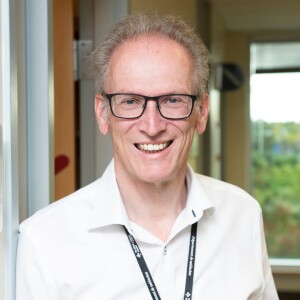
Friday Sep 27, 2024
Friday Sep 27, 2024
After discovering she’s a carrier for Congenital Myasthenic Syndromes, host Kira Dineen sought out to learn more. She met a leading expert in CMS, Dr. Hanns Lochmüller.
Dr. Lochmüller is a neurologist and clinical academic specializing in genetic neuromuscular disorders and rare diseases. He is a Senior Scientist at CHEO Research Institute. He is also a Professor of Neurology at the University of Ottawa Faculty of Medicine and The Ottawa Hospital Department of Medicine.
CMS is a group of rare inherited neuromuscular conditions caused by defects at the neuromuscular junction. While CMS shares similarities with Myasthenia Gravis (MG), it has distinct genetic causes and onset patterns that make diagnosis and treatment challenging.
Dr. Lochmüller walks us through the evolution of CMS research, highlighting the advances made possible by new sequencing technologies. Thirty years ago, only two genes were known to cause CMS; now, there are 35 identified genetic causes. This episode offers a comprehensive look at CMS symptoms, diagnostic approaches, and treatment strategies, as well as the important role genetic testing plays in accurately diagnosing and managing CMS.
Topics Covered in This Episode:
Dr. Lochmüller’s Background and Expertise: How his work in CMS has evolved over the past 30 years.
Key Differences Between CMS and Myasthenia Gravis (MG): The autoimmune vs. genetic origins, age of onset, and differences in symptoms between the two conditions.
Genetic Testing for CMS: How advancements in genetic testing have transformed the diagnosis of CMS and allowed clinicians to better differentiate it from other neuromuscular disorders.
Challenges in Diagnosing CMS: Why some patients are misdiagnosed with muscular dystrophies or unspecific myopathies, and how larger neuromuscular panels and exome sequencing are improving diagnosis.
Common Symptoms of CMS: Ptosis, muscle weakness, and fatigue are key indicators, often seen in the absence of muscle degeneration.
Treatment Approaches for CMS: How treatment depends on the genetic mutation, with drugs like Mestinon benefiting some patients but worsening symptoms in others, such as those with DOK7-related CMS.
The Role of Repetitive Nerve Stimulation Tests: How this diagnostic tool helps identify neuromuscular transmission defects.
Importance of Genetic Diagnosis: How a full genetic diagnosis can provide clarity for patients and improve quality of life by guiding targeted treatment options.
Treatabolome Database: A resource that links specific genetic mutations to the most effective treatments for CMS.
Dr. Lochmüller also shares insights into the variability of CMS symptoms and the resilience of patients living with the condition. He highlights the importance of a genetic diagnosis, as it often brings relief and provides a roadmap for effective management of the disease.
Learn more about ongoing research in CMS here and specifically for the CMS Natural History Study here.
Stay tuned for the next new episode of DNA Today next Friday! New episodes are released every Friday. In the meantime, you can binge over 300 other episodes on Apple Podcasts, Spotify, streaming on the website, or any other podcast player by searching, “DNA Today”. Episodes since 2021 are also recorded with video which you can watch on our YouTube channel, this includes some episodes recorded at NBC Universal Stamford Studios.
DNA Today is hosted and produced by Kira Dineen. Our video lead is Amanda Andreoli. Our social media lead is Kajal Patel. Our Outreach Intern is Liv Davidson. And our logo Graphic Designer is Ashlyn Enokian, MS, CGC.
See what else we are up to on Instagram, X (Twitter), Threads, LinkedIn, Facebook, YouTube and our website, DNAToday.com. Questions/inquiries can be sent to info@DNAtoday.com.
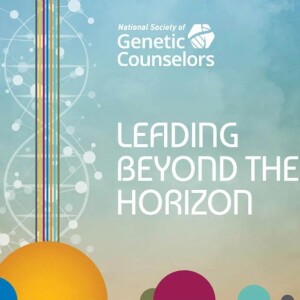
Sunday Sep 22, 2024
Sunday Sep 22, 2024
We’re recapping and reflecting on the 43rd National Society of Genetic Counselors (NSGC) Annual Conference that took place in vibrant New Orleans. As always, the sense of community was incredible, and this year was no exception.
I had the privilege of reconnecting with past guests, sponsors of the show, classmates, and meeting new people. It’s always surreal to meet so many listeners in person—thank you for all your kind words and support! Producing a weekly episode since 2022 has been a labor of love, and this conference gave me the extra boost of motivation to keep going strong.
In this recap episode, I had the chance to chat with attendees about their favorite moments from the conference. All these mini interviews were with genetic counseling students who shared what they learned at the conference. Students were from three programs: University of Pittsburgh, Baylor College of Medicine, and Sarah Lawrence College.
We also took a deeper dive into one of the standout sessions, “Just Because We Can, Should We? Examining PGT Through the Lens of Ableism, Access, and Clinical Actionability” which was moderated by Courtney Studwell, MS, CGC. I caught up with another friend, Jovanni Cuevas, MS, CGC, to debrief on what we learned from the session.
All these interviews were recorded in person at the conference, so you might hear a little background noise, but it adds to the ambiance of the lively event!
Sessions References During The Episode:
- “NSGC 2024 State of the Society Address”
- Breakfast with Biomarin “A Deeper Look Into Achondroplasia”
- “Just Because We Can, Should We? Examining PGT Through the Lens of Ableism, Access, and Clinical Actionability”
- Professional Issues Panel “Genetic Counseling around the Globe” Insights, Lessons, and Collaboration for a Future-Proof Profession”
- “Take it at Faith Value: A Look at the Needs of Genetic Counseling in the Hindu, Pakistani Muslim, Church of Jesus Christ of Latter-day Saints (Mormon), and Orthodox Jewish Communities”
- “Beverly Rollnick Memorial Lecture: Ordering “The Cure” with a Side of Trepidation: The Challenges of Gene Therapy for Sickle Gene Disease”
DNA Today Podcast Episodes Mentioned:
#110 Gattaca, 22 Years Later
#288 CRISPR Cured Victoria Gray’s Sickle Cell: Part 1
#289 CRISPR Cured Victoria Gray’s Sickle Cell: Part 2
#301 Dwarfism with Colleen Gioffreda
#302 DNA Dialogues: Gender-Affirming Terminology and Hereditary Cancer Care
#305 Transformative Therapies for Sickle Cell Disease with “Through The Genes”
#306 NIH’s Dr. Francis Collins’ Leadership in the Human Genome Project and COVID-19
Curious about other NSGC conferences? We have recapped the last six years of conferences including 2019, 2020, 2021, 2022, and 2023.
Other References During The Episode:
- Little People of America (LPA)
- Metabolic NSGC Special Interest Group (SIG)
- DNA Dialogues, Journal of Genetic Counseling’s Podcast
- The Road to Wisdom By Dr. Francis Collins
It was such a meaningful experience to be part of the NSGC 43rd Annual Conference. Whether you joined us in New Orleans or attended virtually, I hope you found the sessions, panels, and networking just as inspiring as we did.
Don't forget to mark your calendars! The 44th NSGC Annual Conference is happening next year in Seattle, WA from November 7-10, 2025. We are already excited to drink lots of Seattle coffee with fellow genetic counselors.
Are you going to the American Society of Human Genetics (ASHG) Annual Conference in Denver, CO in November? Keep your eye out for our host Kira Dineen, who will mostly be in the exhibit hall. Just like this episode, she would be excited to record with you about what you learned at the conference. She also might give you DNA Today merch!
Stay tuned for the next new episode of DNA Today on Friday! New episodes are released every Friday. In the meantime, you can binge over 300 other episodes on Apple Podcasts, Spotify, streaming on the website, or any other podcast player by searching, “DNA Today”. Episodes since 2021 are also recorded with video which you can watch on our YouTube channel, this includes some episodes recorded at NBC Universal Stamford Studios.
DNA Today is hosted and produced by Kira Dineen. Our video lead is Amanda Andreoli. Our social media lead is Kajal Patel. Our Outreach Intern is Liv Davidson. And our logo Graphic Designer is Ashlyn Enokian, MS, CGC.
See what else we are up to on Instagram, X (Twitter), Threads, LinkedIn, Facebook, YouTube and our website, DNAToday.com. Questions/inquiries can be sent to info@DNAtoday.com.
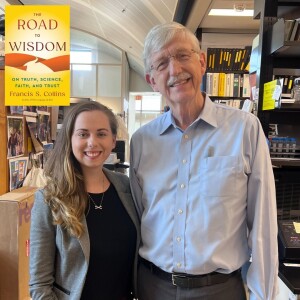
Friday Sep 13, 2024
Friday Sep 13, 2024
In this special episode of DNA Today, we are honored to be joined by one of the most influential figures in modern science, Dr. Francis Collins.
Dr. Collins served as the Director of the National Institutes of Health (NIH) during one of the most critical periods in modern history, including the height of the COVID-19 pandemic. He is also renowned for leading the monumental Human Genome Project, a landmark achievement that revolutionized genetics. Dr. Collins's groundbreaking work includes the discovery of the CFTR gene, which has been crucial in advancing treatments for cystic fibrosis. He is the author of several books, including his brand new book, The Road to Wisdom. Don't forget to enter our giveaway for a copy, links further down.
In this episode, we dive into this new book, which releases on September 17th, 2024. We discuss the insights he has gained throughout his remarkable career, the challenges of bridging science and spirituality, and his reflections on moments of triumph and failure. Dr. Collins also shares personal stories, including his discovery of faith, the difficulties faced during the Human Genome Project, and the challenges of transitioning between political administrations as NIH Director.
Key topics discussed include:
Dr. Collins's experience discovering the CFTR gene and its impact on cystic fibrosis research
The most critical moments of the Human Genome Project and how it reshaped our understanding of genetics
Reflections on his tenure as NIH Director, serving under three U.S. presidents
His response to the COVID-19 pandemic and lessons learned for future public health crises
The role of trust between scientists and the public, and how we can combat misinformation
His thoughts on the intersection of faith and science, and how his beliefs have shaped his career
A special call to action from Dr. Collins’s book: a pledge to reduce animosity, be generous in spirit, and commit to sharing objective truths
Stay tuned until the end for details on our exciting giveaway! We’re offering listeners the chance to win copies of Dr. Collins’s new book, The Road to Wisdom.
Links Mentioned in the Episode:
Enter our giveaway for a chance to win The Road to Wisdom on Instagram, LinkedIn and Twitter/X.
Sign Dr. Collins's Pledge hosted on Braver Angels for a kinder, more understanding world
Check out the organization Dr. Collins’ mentioned: Biologos
Our episode next week will be a tad delayed; it will be a recap of the National Society of Genetic Counselors Annual Conference, which doesn’t wrap up until Saturday, September 21st. But don’t worry we are quick with edits and will have the episode to you after the conference ends.
In the meantime, you can binge over 300 other episodes on Apple Podcasts, Spotify, streaming on the website, or any other podcast player by searching, “DNA Today”. Episodes since 2021 are also recorded with video which you can watch on our YouTube channel, this includes some episodes recorded at NBC Universal Stamford Studios.
DNA Today is hosted and produced by Kira Dineen. Our Video Lead is Amanda Andreoli. Our Social Media Lead is Kajal Patel. Our Outreach Intern is Liv Davidson. And our logo Graphic Designer is Ashlyn Enokian, MS, CGC.
See what else we are up to on Instagram, X (Twitter), Threads, LinkedIn, Facebook, YouTube and our website, DNAToday.com. Questions/inquiries can be sent to info@DNAtoday.com.
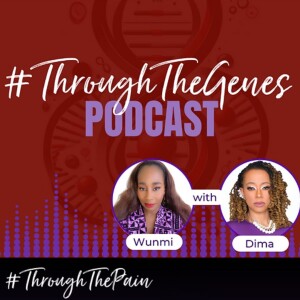
Friday Sep 06, 2024
Friday Sep 06, 2024
On Episodes #288 and #289 of DNA Today, I spoke with Victoria Gray, the first person treated with CRISPR for her Sickle Cell Disease (SCD) symptoms. Since then, I’ve met two amazing patient advocates—Wunmi Bakare and Dima Hendricks—who also have Sickle Cell Disease. They've expanded my understanding of gene therapy and other emerging treatments for SCD, and perfect timing to kick off Sickle Cell Disease Awareness month this September.
In this episode, Wunmi Bakare and Dima Hendricks share their personal journeys with SCD and delve into their experiences exploring curative therapies. They also discuss their new podcast, Through The Genes, launched on World Sickle Cell Day (June 19th, 2024). Their show offers an insightful look into the risks, benefits, and limitations of gene- and cell-based therapies for Sickle Cell Disease.
Topics Covered in This Episode:
Wunmi and Dima’s personal experiences living with Sickle Cell Disease and their exploration of curative therapies
Available curative therapies for Sickle Cell Disease, including stem cell transplants and gene therapy
The obstacles that prevented Dima from qualifying for gene therapy
Wunmi’s stem cell transplant experience, including the procedure, recovery process, and symptom changes post-transplant
The use of the term “cure” in the context of gene therapy for Sickle Cell Disease—how it may create misconceptions
The importance of managing expectations around gene therapy and its long-term effects
How mental health has played a significant role in their SCD journeys, including the emotional aspects of undergoing transformative therapy
The crucial role of support systems—family, friends, and healthcare providers—during and after treatment
Wunmi’s post-stem cell transplant follow-up care and the importance of continuity in care after gene therapy
The harsh reality of medical racism faced by those living with Sickle Cell Disease, and how Wunmi and Dima navigate and advocate within the healthcare system
Their hopes for the future of Sickle Cell Disease treatment and advice for others considering gene therapy
Our Guests:
Wunmi Bakare is a multicultural citizen and advocacy trailblazer in the sickle cell and rare disease communities. Fueled by purpose and the pursuit of social inclusion, her advocacy efforts focus on erasing the stigma of sickle cell disease through proactive and reactive engagement with the media.
She sits on the curative therapy advisory board for Beam Therapeutics, Vertex Pharmaceuticals, Pfizer, and Healthful Data and is a patient ambassador for Health Union and AllStripes. She was diagnosed with the most severe type of sickle cell disease (HbSS) at 18 months then participated in a clinical trial at the National Heart, Lung and Blood Institute (NIH-NHLBI) where she received an allogeneic stem cell transplant in 2019.
Bakare thrives as the Founder of WBPR Agency working across diverse corporate disciplines and providing strategic media counsel to top brands. In 2020, she launched #SickleCellProdigy, a platform that celebrates the lived experience of sickle cell patients globally.
Dima Hendricks, a resilient sickle cell advocate and co-founder of #ThroughThePain Inc., has dedicated over two decades to championing health awareness. Her journey includes conducting health workshops and contributing to various panel discussions. Collaborating with esteemed organizations like the American Red Cross and the American Heart and Stroke Association, Dima has extended her impact in the health community.
In addition to her advocacy, Dima has an impressive history in pageantry. She has earned titles such as Miss Black Dorchester USA, Miss Black Massachusetts USA, Mrs. Massachusetts International, and the 2024 International Mrs New England. Her experience in the pageant world spans over ten years, during which she has taken on roles as a director, coach, and judge.
Dima's inspiring story of overcoming obstacles is captured in her book "Unleashing Royalty," where readers can discover her journey to triumph.
During the episode we also mentioned #BoldLipsForSickleCell (Now Bold Plus+).
Wunmi Bakare and Dima Hendricks are passionate patient advocates and hosts of Through The Genes, a podcast dedicated to educating and empowering those affected by Sickle Cell Disease. Both Wunmi and Dima use their personal experiences with SCD to raise awareness and spark change within the medical community, focusing particularly on the potential of gene therapies. Stay tuned for part two of our conversation, where I’ll be a guest on their show, Through The Genes, to continue this important dialogue! You can listen by searching “Through The Genes” in your podcast app or on their website ThroughTheGenes.com and follow the show on Instagram, LinkedIn, and Facebook. You can personally follow Wunmi Bakare and Dima Hendricks as well. Not only is it an audio podcast, but like us, they also produce it as a video podcast and you can watch all episodes here.
Stay tuned for the next new episode of DNA Today next Friday! New episodes are released every Friday. In the meantime, you can binge over 300 other episodes on Apple Podcasts, Spotify, streaming on the website, or any other podcast player by searching, “DNA Today”. Episodes since 2021 are also recorded with video which you can watch on our YouTube channel, this includes some episodes recorded at NBC Universal Stamford Studios.
DNA Today is hosted and produced by Kira Dineen. Our social media lead is Corinne Merlino. Our video lead is Amanda Andreoli. Our Outreach Intern is Sanya Tinaikar. Our Social Media Intern is Kajal Patel. And our logo Graphic Designer Ashlyn Enokian.
See what else we are up to on Instagram, X (Twitter), Threads, LinkedIn, Facebook, YouTube and our website, DNAToday.com. Questions/inquiries can be sent to info@DNAtoday.com.
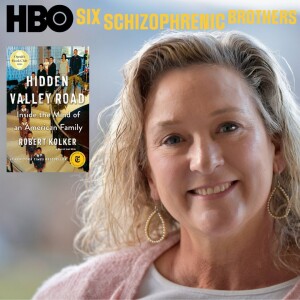
Friday Aug 30, 2024
Friday Aug 30, 2024
Content/Trigger Warning: This conversation includes sensitive topics of sexual abuse, violence, suicide, and homicide. It is not suitable for younger audiences.
We delve into the complex and deeply personal story of the Galvin family, which has played a significant role in the history of schizophrenia research. Our guest, Lindsay Mary Galvin Rauch, is the youngest of twelve siblings in the Galvin family, six of whom were diagnosed with schizophrenia. Their family's genetic material has been a cornerstone of nearly every major genetic study on the disorder since the 1980s, contributing invaluable insights into the genetic underpinnings of schizophrenia.
Lindsay shares her unique perspective growing up in a large family profoundly affected by mental illness, as chronicled in Robert Kolker's award winning book Hidden Valley Road and the HBO 2024 documentary Six Schizophrenic Brothers.
Hidden Valley Road has achieved a long list of accolades…
Instant #1 NEW YORK TIMES best-seller
Official selection of OPRAH’S BOOK CLUB
A NEW YORK TIMES, WALL STREET JOURNAL, and WASHINGTON POST Top Ten Book of the Year
PEOPLE ’s #1 Best Book of the Year
Named a Best Book of the Year by NPR, Time, Slate, Smithsonian, Forbes, Audiophile, Parade, Kirkus, Library Journal, Publisher’s Weekly, the Evening Standard (UK), the Sunday Times (UK), The New York Post, and Amazon
Finalist, PEN/John Kenneth Galbraith Award for Nonfiction
Featured in PRESIDENT BARACK OBAMA’s list of favorite books of the year
Lindsay's life's journey inspired her evolution from victim and survivor to advocate and thriver. She enjoys sharing her story of the courage to heal and fortitude in adversity. The hope for greater compassion for those affected and their families is her north star. Lindsay is a board member of The Henry Amador Center on Anosognosia and Well Power (formally the Mental Health Center of Denver).
Beyond discussing the scientific impact of her family's contributions, Lindsay opens up about her personal experiences, including the challenges of living with so many siblings diagnosed with schizophrenia, the role of trauma in mental health, and her decision to take on the responsibility of caring for her brothers later in life.
Listeners will gain insights into the following topics:
The Galvin family's pivotal role in schizophrenia research and the discovery of a SHANK2 gene mutation linked to the disorder.
The varied symptoms of schizophrenia among her brothers and what this diversity reveals about the condition.
The impact of trauma on the onset of schizophrenia symptoms, and how this played out in her family.
The challenges and responsibilities of managing care for siblings with schizophrenia, including the effects of medications, electroshock therapy, and the issue of anosognosia (lack of insight into one's illness).
The ongoing stigma surrounding schizophrenia and the need for societal change to better support those with mental health disorders.
The process of genetic testing for the SHANK2 familial mutation and the decisions made regarding her own children.
Lindsay’s reflections on personal resilience, mental health, and her hopes for the future of schizophrenia research.
During the interview we mentioned a couple content/resources to check out including…
“The Immortal Life of Henrietta Lacks” by Rebecca Skloot (Check out Episode #34 of DNA Today where descendents of Henrietta Lacks were interviewed)
“The Collected Schizophrenias: Essays” by Esmé Weijun Wang
Spotlight Documentary Directed by Tom McCarthy
National Alliance on Mental Illness (NAMI)
Patrick J. Kennedy’s Books, “Profiles in Mental Health Courage” and “A Common Struggle”
LEAP Institute
Also during the episode Kira and Lindsay Mary weren’t confident about the name of the therapy that Peter was receiving. They should have been, as they got it right, electroconvulsive therapy (ECT).
Lindsay has been launched onto the international stage due to her family's story. She has spoken for the Psych Congress, The NEI Conference, and many other prestigious programs. Speaker Inquiries are accepted at lindsaymarygalvinracuh.com. and donations to assist with her brother's care can be made at GalvinFamilyTrust.org.
Stay tuned for the next new episode of DNA Today next Friday! New episodes are released every Friday. In the meantime, you can binge over 300 other episodes on Apple Podcasts, Spotify, streaming on the website, or any other podcast player by searching, “DNA Today”. Episodes since 2021 are also recorded with video which you can watch on our YouTube channel, this includes some episodes recorded at NBC Universal Stamford Studios.
DNA Today is hosted and produced by Kira Dineen. Our video lead is Amanda Andreoli. Our social media lead is Kajal Patel. Our Outreach Intern is Liv Davidson. And our logo Graphic Designer is Ashlyn Enokian, MS, CGC.
See what else we are up to on Instagram, X (Twitter), Threads, LinkedIn, Facebook, YouTube and our website, DNAToday.com. Questions/inquiries can be sent to info@DNAtoday.com.
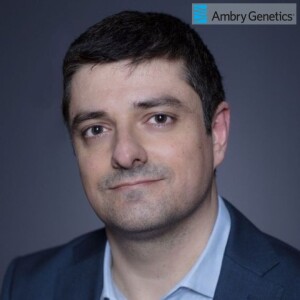
Friday Aug 23, 2024
Friday Aug 23, 2024
We have wanted to explore the role of RNA analysis in genetic testing for a long time on DNA Today, but waited until we could get THE leader in the space, Ambry Genetics. The Vice President of Research and Development and head of their Translational Genomics lab, Dr. Rachid Karam, was kind enough to come on to have this long awaited conversation.
We'll discuss Ambry Genetics' history of innovation in RNA testing, how it has increased diagnostic yield and reduced Variants of Uncertain Significance in hereditary cancer testing, and its role in closing health disparity gaps. We'll also introduce ExomeReveal, Ambry’s new exome testing product that includes RNA analysis, extending our expertise to rare diseases.
Dr. Rachid Karam obtained his M.D. in 2003 at UFCSPA in Brazil, and his Ph.D. in Oncogenetics in 2008 at the University of Porto, Portugal. During his Ph.D. he studied the role of the tumor suppressor gene CDH1 in cancer predisposition. He did his postdoctoral fellowship at the University of California San Diego (UCSD) from 2009 to 2014 where he studied the role of the NMD mRNA surveillance pathway in cancer. He joined Ambry Genetics in 2014 and is now Ambry’s Vice President of Research & Development. His work focuses on strategies to improve the positive yield of clinical genetic testing, including the clinical implementation of new technologies such as RNA-seq and Long-Read sequencing. He also actively participates in several ClinGen committees dedicated to creating guidelines for the interpretation of genetic testing results, such as the BRCA1 and BRCA2 Variant Curation Expert Panel (VCEP) and is currently the co-chair of the ClinGen CDH1 VCEP.
Discussion Topics:
Ambry Genetics' Leadership in RNA Analysis:The journey of Ambry Genetics in becoming a pioneer in RNA testing.
Initial challenges and breakthroughs in RNA analysis.
Mechanics and Benefits of RNA Testing:How RNA testing works and its role in accurately classifying genetic variants.
The impact of RNA testing on increasing diagnostic yield and reducing VUS in hereditary cancer testing.
The process of reclassifying variants from VUS to likely pathogenic or benign using RNA analysis.
Concurrent DNA/RNA Analysis:The rationale behind Ambry's preference for concurrent DNA/RNA analysis.
Potential future shifts in the necessity of concurrent analysis as RNA evidence accumulates.
Addressing Health Disparities:Benefits of RNA testing for non-white patients in hereditary cancer testing.
Introducing ExomeReveal:Integration of RNA analysis into Ambry's new exome testing product, ExomeReveal.
Importance of RNA analysis for splice site variants identified during exome testing.
Comparison of ExomeReveal to standard exome tests in terms of diagnostic yield.
Case Studies and Future Directions:Example case demonstrating the clarity and diagnosis provided by RNA analysis.
Expectations and anticipated outcomes for extending RNA expertise to rare diseases.
Implications for Genetic Counseling and Patient Management:Integration of RNA testing into exome and hereditary cancer testing and its impact on genetic counseling.
Evolution of patient management as RNA testing integration improves.
During the episode we referenced three other episodes of DNA Today…
#95 Kieger Family on Familial Adenomatous Polyposis
#297 Exome Reanalysis with Ambry Genetics
#299 Genetic Causes of Epilepsy with Dr. Mattison, Dr. Oliveira and Ana Rita
Thanks again to Dr. Rachid Karam for helping us uncover the transformative potential of RNA analysis in genetic testing and its far-reaching implications for patient care.
Stay tuned for the next new episode of DNA Today next Friday! New episodes are released every Friday. In the meantime, you can binge over 300 other episodes on Apple Podcasts, Spotify, streaming on the website, or any other podcast player by searching, “DNA Today”. Episodes since 2021 are also recorded with video which you can watch on our YouTube channel, this includes some episodes recorded at NBC Universal Stamford Studios.
DNA Today is hosted and produced by Kira Dineen. Our video lead is Amanda Andreoli. Our Social Media Intern is Kajal Patel. And our logo Graphic Designer is Ashlyn Enokian.
See what else we are up to on Instagram, X (Twitter), Threads, LinkedIn, Facebook, YouTube and our website, DNAToday.com. Questions/inquiries can be sent to info@DNAtoday.com.








